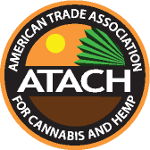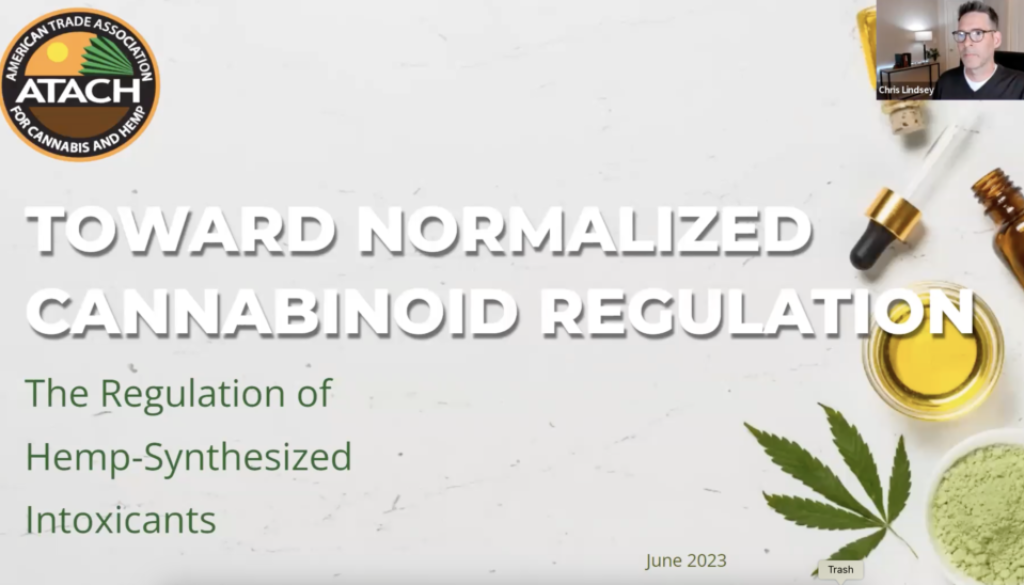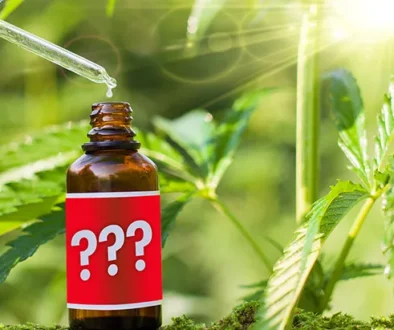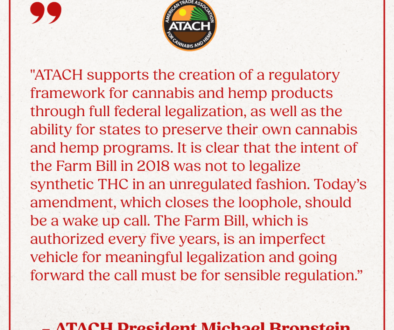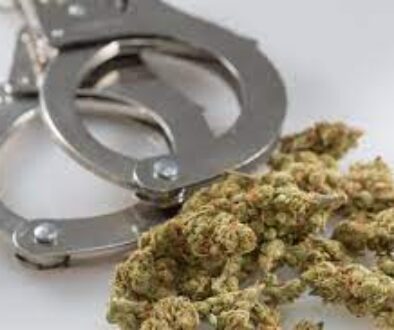ATACH Releases Regulatory Recommendations on Hemp-Synthesized Intoxicants
ATACH Releases Regulatory Recommendations on Hemp-Synthesized Intoxicants
Calls on Congress to Take Action on Farm Bill
(Washington, D.C) – The 2018 Farm Bill created regulatory uncertainty, incentivizing some companies to sell intoxicants derived from hemp outside of regulation. Current language defines hemp as Cannabis Sativa L. with a concentration of Delta-9 THC not greater than .3 percent. However, companies are synthesizing hemp-derived compounds into intoxicants that are far more potent than cannabis products available for consumption under any existing regulated cannabis market.
This new type of intoxicant is being sold in gas stations, retail stores, and online. They often come in the form of gummies and vape cartridges and contain hemp-synthesized intoxicants such as delta-8 THC, delta-10 THC, HHC, THCp, and more.
Such products, which some believe are legal under the existing 2018 Farm Bill, present a threat to public health and safety, exploit consumer confusion on levels of intoxication, have no limitations as seen in state-legal cannabis markets such as advertising or selling to minors, product warnings, or how intoxicating they are, where or to whom they are sold, or requirements to understand safety or efficacy.
Hemp-synthesized intoxicating (HSIs) products are popular, widespread, and easy to make.
Today, the American Trade Association for Cannabis and Hemp (ATACH) released a policy paper, “Toward Normalized Cannabinoid Regulation, Regulation of Hemp-Synthesized Intoxicants,” providing regulatory solutions at both the federal and state levels to improve consumer safety and facilitate the functional growth of the marijuana and hemp.
The organization advocates to regulate production through a consistent and normalized regulatory scheme particularly as the federal Farm Bill advances to an end-of-year 2023 mark up.
ATACH today also hosted an expert panel discussion on this topic featuring Chris Ferguson, Vice President, Government Affairs & Policy for Verano; Bob Miller of ACT Labs; Dr. Christopher Hudalla, Ph. D., President/Chief Scientific Officer, ProVerde Laboratories; and Ann Torrez, Executive Director of the Arizona Dispensaries Association.
Their recommendations and message to Congress and state policymakers include:
-
Amending the definition of hemp to account regulation for final product
-
Adopting standards for all intoxicating cannabinoids, whether from marijuana or hemp
-
TTB should regulate intoxicating products in adult-use settings
-
FDA should provide a pathway for non-intoxicating cannabinoids such as CBD
-
State labs should be provided with federal technical assistance
-
Retail sales should be limited to adults 21 or over anywhere intoxicants are available
-
Intoxicating cannabinoid products should be regulated in marijuana programs
-
Regulators should adopt uniform testing and labeling standards
-
Enforcement efforts should be supported, and regulations should promote public health and safety
Chris Ferguson, Vice President of Government Affairs for Verano and a former Florida regulator, discussed his experience overseeing Florida’s medical marijuana program under the purview of the Department of Health while HSIs were emerging in Florida under the guidance of the Department of Agriculture.
“As a regulator, I would receive complaints from patients who thought they obtained products from a licensed medical dispensary when in fact the product came from a CBD shop.
“The marketing of CBD shops added confusion to medical marijuana patients in Florida. We need clear legal definitions, testing protocols, public education campaigns, and inter-agency collaboration to address the challenges with HSIs and marijuana.”
Bob Miller, COO of Science and Operations at ACT Labs, detailed a Pennsylvania-based study of 21 CBD/Delta-8 THC labeled products purchased at convenience stores, retail stores, and smoke shops in western PA. Not only were these products packaged to look like candy – of the 21 samples – 4 had heavy metals, including one that had lead that would be above state limit for cannabis products and one product with arsenic above the state limit. Additionally, 9 products contained Delta-9 THC, with 4 of those having Delta-9 above the legal limit – making it intoxicating.
“These materials really need to be regulated,” said Miller.
“The purpose of marijuana legalization programs, at their heart, is the regulation of intoxicants from the cannabis plant. Ideally, that is where regulation of all cannabis derived intoxicants should also take place — within the context of a marijuana regulatory program both state and federal, and with adult-use cannabis legalized throughout the country,” said ATACH President Michael Bronstein.
###
ATACH: The American Trade Association for Cannabis and Hemp (ATACH) is the leading United States 501(c)(6) cannabis industry trade organization promoting the expansion and protection of legal sales of cannabis and hemp for industrial, medical, and adult use.
